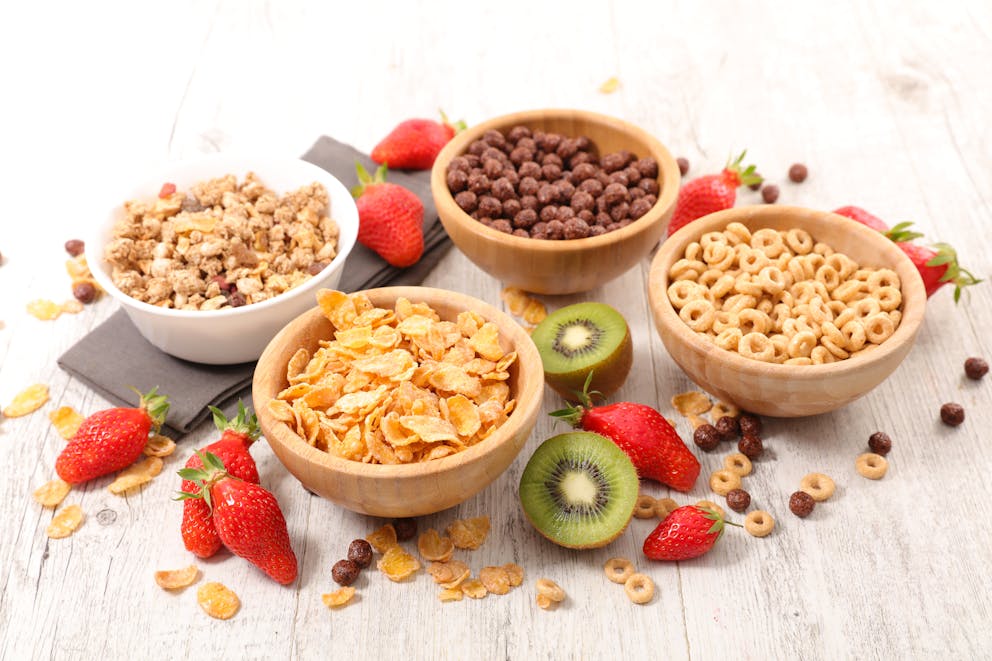Get Your Kids and Babies Off Cereal
As a parent, I get it. You want the best for your baby. But when it comes to feeding them cereal, I've got some shocking news that might make you think twice.
Did you know that infant rice cereal can contain harmful levels of inorganic arsenic? Crazy, right? And that's not all. Introducing cereals too early can also increase the risk of autoimmune diseases.
Honestly, you might as well be flipping a coin on your kid’s health safety.
I know, I know. So, you might be scratching your head, thinking cereal was part of the good-for-you gang. Hold onto your hats; we're about to spill some secrets on this so-called perfect baby food.
Understanding the Risks of Infant Cereals
As a parent, you want to give your baby the best possible start in life. But when introducing solid foods, it's crucial to be aware of the potential risks associated with certain choices - like infant cereals.
While rice cereal has been a go-to first food for generations, recent research has raised some serious red flags about its safety for children. Let's take a closer look at what you need to know.
The Presence of Inorganic Arsenic in Rice Cereal
One of the biggest concerns with infant rice cereal is the presence of inorganic arsenic. This toxic substance occurs naturally in the environment and can find its way into our food supply, especially in rice products.
The problem is that babies are particularly vulnerable to the effects of arsenic exposure. Their small bodies and developing brains are more sensitive to toxins and consume more food relative to their body weight than adults.
Studies have shown that infants who regularly consume rice cereal have higher levels of arsenic in their bodies. Over time, this exposure can lead to developmental delays, lower IQ scores, and even cancer later in life.
Autoimmune Diseases and Early Cereal Introduction
Another issue with feeding infants cereal too early is the increased risk of developing autoimmune diseases. Research suggests that introducing gluten-containing cereals before 3 months of age can trigger an immune response in some babies.
This reaction may set the stage for conditions like celiac disease, type 1 diabetes, and other autoimmune disorders down the road. The immature gut of a young infant isn't equipped to handle complex proteins like gluten.
Experts recommend waiting until at least 4-6 months to start solids, and even then, rice cereal doesn't have to be the first choice.
Opting for more nutrient-dense options like pureed vegetables, fruits, and meats can provide the nourishment babies need without the added risks.
Nutritional Concerns and Digestive Health
Beyond the arsenic and autoimmune issues, there are other reasons why infant cereals may not be the best choice for your baby's developing digestive system and overall nutrition.
Lack of Digestive Enzymes in Infants
Babies are born with immature digestive tracts that are still developing the enzymes needed to break down complex carbohydrates like those found in grains.
Amylase, in particular, is a crucial enzyme for digesting starch - and it's one that infants don't produce in significant amounts until around 6 months of age.
Introducing cereals too early can lead to digestive discomfort, gas, and even damage to the delicate gut lining. This is why it's so important to follow your baby's cues and wait until they show signs of readiness for solids, such as good head control and interest in food.
High Sugar Content and Its Effects
Another concern with many commercial infant cereals is their high sugar content. Even those marketed as "plain" or "unsweetened" can contain surprising amounts of added sugars, often in the form of fruit juice concentrates or other sneaky ingredients.
Excessive sugar intake in infancy has been linked to a host of health problems, including obesity, tooth decay, and a preference for sweet tastes that can shape eating habits for life.
Babies simply don't need the extra sugar - breast milk or formula provides all the sweetness they require.
Phytate and Mineral Absorption
Cereals, particularly those made from whole grains, contain a compound called phytate that can interfere with your baby's ability to absorb essential minerals like iron, zinc, and calcium.
These nutrients are crucial for healthy growth and development, especially in the first year of life.
While fortified infant cereals are designed to provide extra iron, the presence of phytate can actually block its absorption in the gut. This means that even if you're choosing an iron-fortified cereal, your baby may not be getting the full benefit of this added nutrient.
To maximize mineral absorption, it's best to focus on iron-rich foods like meat, poultry, fish, and leafy greens, and pair them with vitamin C sources like fruits and vegetables to enhance uptake.

Allergies, Inflammation, and Chemical Exposure
In addition to the digestive and nutritional concerns, infant cereals can also pose risks related to allergies, inflammation, and exposure to harmful chemicals. Here's what you need to know:
Wheat Allergies and Inflammatory Conditions
While rice cereal is the most common first food, many parents also turn to wheat-based cereals as an alternative. However, wheat is one of the top eight allergens, and introducing it too early can increase the risk of developing a wheat allergy.
Symptoms of a wheat allergy can range from mild (hives, itching, nausea) to severe (trouble breathing, anaphylaxis). In some cases, a wheat allergy in infancy can even lead to eosinophilic esophagitis, a chronic inflammatory condition of the esophagus.
Beyond allergies, the gluten in wheat-based cereals can also trigger an inflammatory response in some babies. This is particularly concerning for those with a family history of celiac disease or gluten sensitivity.
Glyphosate Exposure Through Cereals
Another issue with many conventional cereal grains is their potential for pesticide residues, particularly glyphosate. This widely used herbicide has been linked to cancer and other health concerns, and has been found in alarming levels in some oat-based cereals.
A recent report from the Environmental Working Group found that more than 95% of oat-based cereals tested contained detectable levels of glyphosate, with some products exceeding the safety threshold for children.
While organic cereals tend to have lower levels, they're not necessarily glyphosate-free.
To minimize your baby's exposure, it's best to choose organic options whenever possible and to vary the grains and other foods you offer. Relying too heavily on any one type of cereal can increase the risk of chronic pesticide exposure.
Synthetic Vitamins in Fortified Cereals
Many infant cereals are fortified with synthetic vitamins and minerals to boost their nutritional profile. While this may seem like a good thing, there are concerns about the long-term effects of these added nutrients.
Synthetic vitamins and minerals are not always absorbed and utilized by the body in the same way as naturally occurring nutrients. Some studies suggest that high doses of certain synthetic vitamins, like vitamin A, may even be harmful in excess.
What's more, infants may not be able to properly metabolize and excrete excess amounts of these added nutrients, leading to a potential risk of toxicity over time.
It's generally best to rely on whole food sources of vitamins and minerals rather than fortified products.
Sugar Content Comparison and Regulatory Insights
As concerning as the arsenic and allergy risks are, the high sugar content in many infant cereals is equally alarming. Let's take a closer look at just how much sugar our babies may be getting from these seemingly innocent products.
Sugar Discrepancy Between Children's and Adult Cereals
A study published in the Journal of Nutrition Education and Behavior found that on average, children's cereals contain a whopping 40% more sugar than adult cereals.
Some of the worst offenders pack in as much as 12 grams (3 teaspoons) of sugar per serving - nearly half of the daily recommended limit for adults.
What's more, many parents assume that infant cereals are a healthier choice than those marketed to older kids. But the truth is, even "plain" rice cereal can contain added sugars in the form of fruit juice concentrates or other sweeteners.
All this extra sugar not only contributes to the risk of obesity and tooth decay but can also shape your baby's taste preferences for years to come. Studies show that infants who consume high-sugar diets tend to prefer sweeter foods throughout childhood and beyond.
Regulatory Actions on Arsenic Levels
Fortunately, regulatory agencies are starting to take action on the arsenic issue in infant rice cereals. In 2016, the FDA proposed a limit of 100 parts per billion (ppb) for inorganic arsenic in infant rice cereal - a level that most products on the market currently meet.
However, many experts argue that this limit is still too high, especially given the unique vulnerability of infants. The European Union, for example, has set a much lower maximum level of 100 ppb for rice intended for the production of food for infants and young children.
Some manufacturers are also taking steps to reduce arsenic levels in their products. One leading brand recently introduced a new line of infant cereals made from other grains like oats, barley, and quinoa, which tend to have lower arsenic levels than rice.
Still, many parents and advocacy groups are calling for stricter regulations and more transparent labeling to help families make informed choices about the foods they feed their babies.
At the end of the day, the decision of when and how to introduce solid foods is a personal one that every family must make based on their unique circumstances and values.
But by staying informed about the potential risks and benefits of different options, you can feel confident in choosing the best path forward for your little one.

Cereal Conundrum
Delve into the potential health risks associated with feeding cereal to young children. While cereal is often perceived as a convenient and quick breakfast option, it may not always be the healthiest choice, especially for infants and young children.
This guide explores the potential risks of feeding cereal to this demographic, including its high sugar content, lack of essential nutrients, and potential for contributing to childhood obesity and dental issues.
Additionally, it examines the common question, "Is Cereal Bad for You?" by discussing the varying nutritional profiles of different types of cereal and the importance of moderation in consumption.
By unraveling the cereal problem and examining the truth behind its health implications, parents and caregivers can make informed decisions about the dietary choices of their infants and children, prioritizing their health and well-being.
Conclusion
So, there you have it. The shocking truth about the health risks of feeding cereal to infants and children. From inorganic arsenic to allergies and digestive issues, it's clear that cereal isn't the innocent baby food we once thought it was.
But don't worry, you're not alone in this. As parents, we're all just trying to do what's best for our little ones. And now that you're armed with this knowledge, you can make informed decisions about what to feed your baby.
Remember, there are plenty of healthy alternatives out there. How about we say goodbye to cereal and hello to more secure options for our children? Together, we can give them the best start in life, without compromising their health.
Previous blog
Game of Thrones Meets Your Immune SystemTags

Popular
08/21/2024
55K views
02/23/2025
46.4K views
11/18/2024
278K views
03/18/2024
11/21/2022




